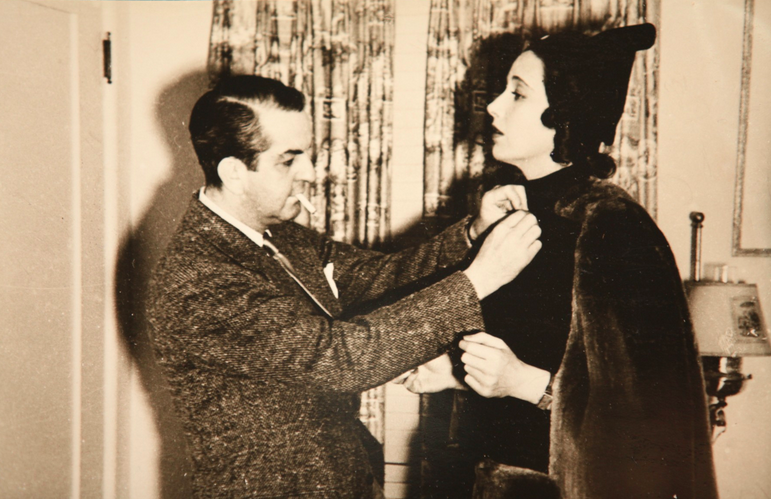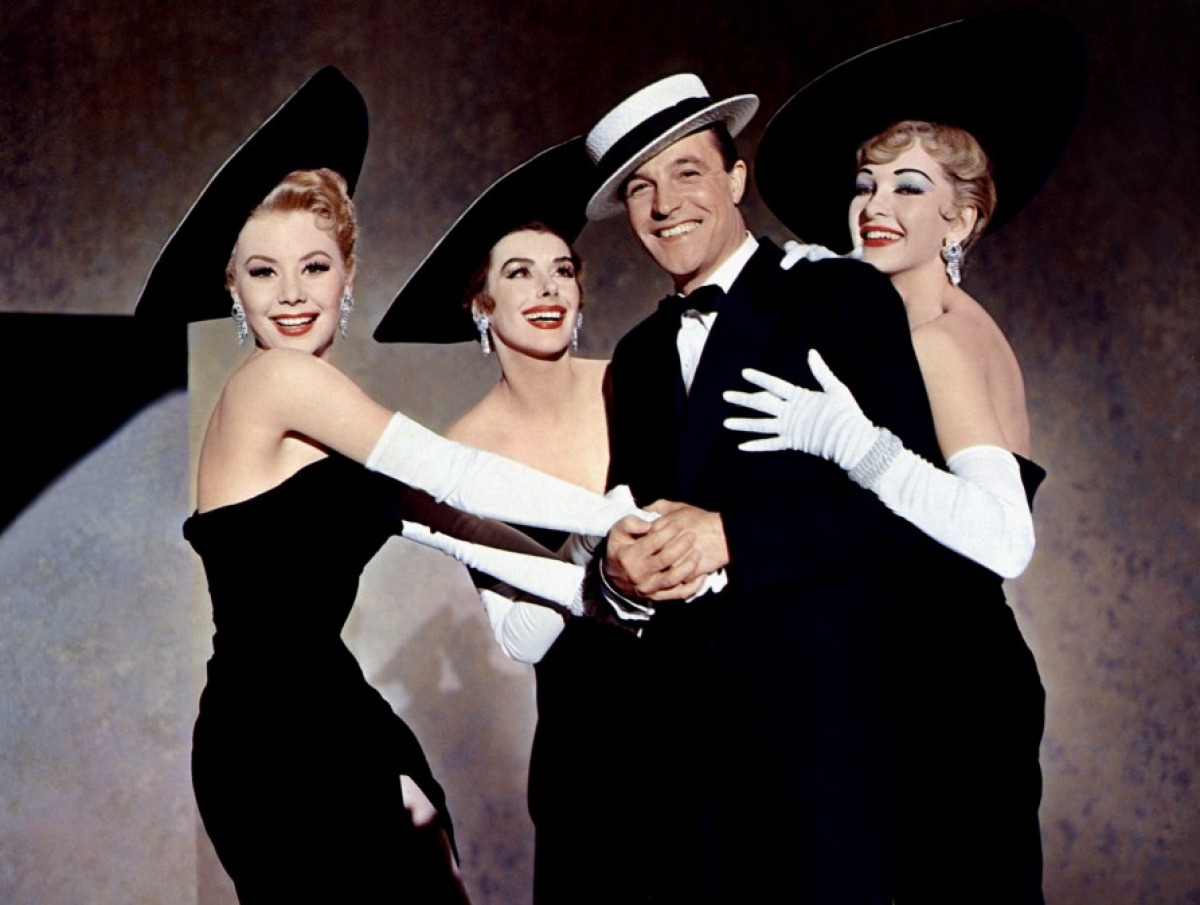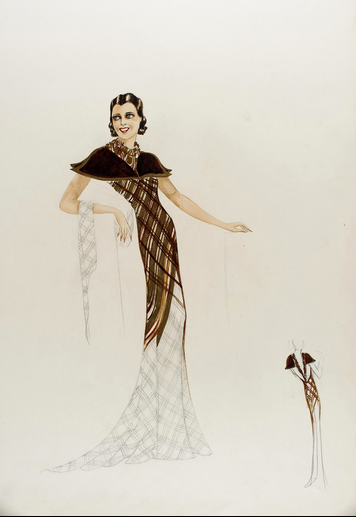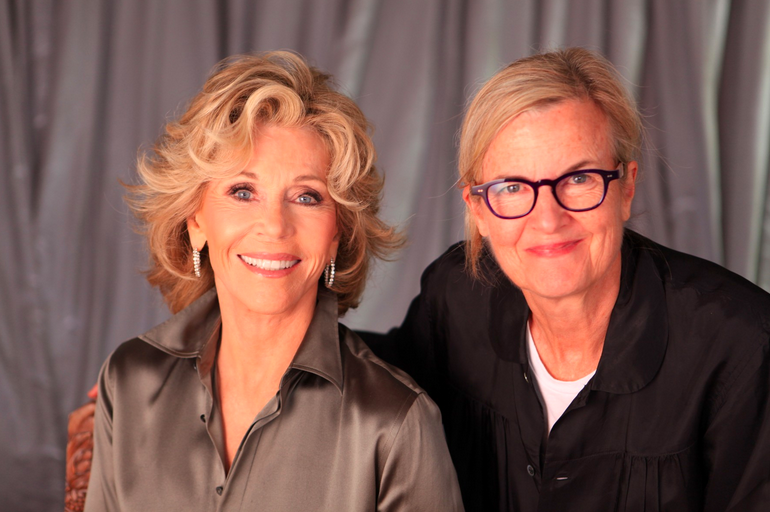Interview: Gillian Armstrong on Her Orry-Kelly Documentary and Why the Film Industry Needs Affirmative Action
 Friday, September 18, 2015 at 11:55PM
Friday, September 18, 2015 at 11:55PM Jose interviews the director of a new costume design documentary at TIFF
 Orry-Kelly with Kay Francis. Photo courtesy of Scotty Bowers
Orry-Kelly with Kay Francis. Photo courtesy of Scotty Bowers
In Women He’s Undressed, the extraordinary Gillian Armstrong paints a delightful portrait of Australian costume designer Orry-Kelly whose bold designs changed Hollywood forever (he was the first costume designer to draw the actors' faces on his designs!). The brilliant man behind Ingrid Bergman’s tasteful suits in Casablanca, Rosalind Russell’s larger than life gowns in Auntie Mame, and Marilyn Monroe’s nude dress from Some Like It Hot (he did Jack and Tony’s dresses too) had an exciting life that had him leave his small hometown to find a career in a budding industry across the world. From gangsters and plays with an unknown Katharine Hepburn, to affairs with Cary Grant and uprisings with Bette Davis, Orry-Kelly’s life was so rich that one wonders why no one had done a film about him before.
In typical Armstrong fashion, the documentary is told with whimsical flourishes (Darren Gilshenan plays Orry who reads from letters and adds commentary) and features interviews with Colleen Armstrong, Michael Wilkinson, Jane Fonda, Catherine Martin, Angela Lansbury and the legendary Ann Roth, all of whom express their admiration for Orry, and share anecdotes about working with him. The film played at the Toronto Film Festival, and I had the opportunity to talk with Ms. Armstrong about discovering Orry’s work, working with Ann Roth (“someone should do a documentary on her next, she’s extraordinary”) and her thoughts on the way the industry treats women.
Orry-Kelly, Australian Oscar winners, and artists as film subjects after the jump...
 Les Girls (1958) won Orry-Kelly the second of his three Oscars
Les Girls (1958) won Orry-Kelly the second of his three Oscars
JOSE: You have mentioned that you didn’t know much about Orry-Kelly before you started working on the film.
GILLIAN ARMSTRONG: The father of my producer, Damien Parer, was the first Australian to ever win an Academy Award in 1945 for his documentary Kokoda. Damien was named after his father, who died soon after, and he went on to become a film and television producer. He was researching Australians who’d won awards and there he saw Orry’s name, who at that point with three, had won more Academy Awards than any other Australian, until Catherine Martin won her fourth. He realized that not many people knew him and thought he deserved a film, so he asked me if I was interested in doing a documentary, and I’m ashamed to admit I originally went “well, who’s he?” Then I looked at his filmography and realized I knew all those films! I’ve cried to Casablanca, I’ve seen Auntie Mame, 42nd Street, The Maltese Falcon...I couldn’t believe they were designed by the same person, who also happened to be an Australia. I have to say that having worked on my own films with some of the world’s most wonderful costume designers I really do think it’s an unheralded art. People don’t really understand the amount of work and genius that goes on behind the scenes, so I was keen to tell that side of the story. Not only to research Orry’s life, but also to show what contribution costume designers make to movies.
 JOSE: I was so shocked, and also laughed a little, when we hear that anecdote about the violins electrocuting the dancers in one of those complicated sequences in Gold Diggers of 1933…
JOSE: I was so shocked, and also laughed a little, when we hear that anecdote about the violins electrocuting the dancers in one of those complicated sequences in Gold Diggers of 1933…
(Laughs)
….so it made me think of how the studio system implemented this notion that movies were all glamour and magic, and usually tried to make audience members as little aware of the work it takes to make a movie as possible.
GILLIAN ARMSTRONG: I’m so sad those days are gone! With those amazing artists who were sewing and doing embroidery. Hundreds and hundreds of people who helped contribute to those costumes.
Do you think this idea of movie magic manifesting out of thin air, in some way desensitized audience members? After WWII, American society became all about consumerism, without thinking much about the labor that goes into creating new cars or toasters.
I suppose it’s the same with a lot of the areas behind the scenes. How much do we really want to give away about how much effort goes into everything, the scripts, the editing, the composer, needing to change a piece of music that makes or breaks your film. Each of our roles, as directors, cinematographers and actors, is to create a world that you the audience will want to go into. You don’t want them to think about the artifice when you’re telling a story. If you’re telling a story about someone like Orry for instance, said to be one of the greatest costume designers of all time, you want to show people what about him made him so good.
Colleen Atwood says in the film that classic movies seep into your unconscious like dreams, and you realize the effect they had on your life much later. I love when she says that the design for Edward Scissorhands came from Irma La Douce!
Good, you picked that up! A lot of people don’t pick that up and I thought I should explain more about it. It was a really funny thing, because almost everyone I interviewed had a favorite Orry-Kelly movie and I asked them to talk about it in more depth, so the morning that Colleen came to the interview she said she wanted to talk about Irma La Douce, so I put on the DVD and it was only looking at the film on that day during the interview when it struck her, she said “oh my god, this is it, this is Johnny’s dress!”, the color scheme too, she had taken it subliminally. Movies do that to us, a lot of people asked me how I decided on the lighting and the color of my films, and I think it was just being in film school for three years. Watching the best European films, I was saturated with the beauty of The Conformist, or a Bertolucci film, I wasn’t consciously doing it, but it surfaces eventually. I always tell young filmmakers, go see the best cinema, you should have the best influence, don’t stay at home and watch badly lit soap operas, see everything!
You have made so many films about artists and writers…
I have, haven’t I? (Laughs)
...what fascinates you so much about about the creative process to have you make films about it?
It hasn’t been planned. My Brilliant Career was about someone who was fighting repression as an artist, and finally wrote a book. I’d never even heard of the book before, my producer brought it to me, but let me tell you what happens in the industry is that the minute you make something, everyone wants you to make the same thing again, so I was offered so many stories about women achievers, period pieces...and that’s why I went to do Starstruck instead. I wanted to show I was not just interested in stories that talk about a woman’s role in the world, I am interested in other things. So when years later Denise Di Novi offered me Little Women, I said no like three times, I said I’d already done a film about a woman writer, so she cleverly told me My Brilliant Career had been done years ago and this was a new generation, and that this was a story about family. She was right, I think what captures people about that story is the sisters. I also did a documentary about wallpaper designer Florence Broadhurst, and it wasn’t just that her designs were wonderful, she also had an amazing life, she was so naughty, a con artist, she was murdered in the end, and there were many people who might have done it. It wasn’t only about her art, which as a craftsperson interests me, but also about her life story. Same for Orry, besides the art aspects, it’s also about homophobia and his relationship with Cary Grant as well.
 Jane Fonda and Gillian Armstrong. Credit: Anna Howard
Jane Fonda and Gillian Armstrong. Credit: Anna Howard
Considering how terrific Darren is in the parts where he plays Orry. Were you ever tempted to turn the film into a full blown biopic?
Well not on the budget that we had, I’m afraid (laughs). I do love documentaries, because when you can show newspaper clips, and footage from the time, there’s a different art to making documentaries, but as a viewer you also feel this is truth. You hear people talking about him, and I wanted to show his work as well. Whoever does his biopic, and here’s hoping because his memoir is now being published, and gets to recreate all those wonderful scenes from An American in Paris and the Busby Berkeley films will do a big number. When we were choosing clips for our film, I really wanted to do these director’s service, not just for Orry’s sake, but also for the filmmakers.
Hollywood has changed a lot, and at the same time has changed so little. Gay men and women are still being denied the opportunities straight males have. Some gay actors feel if they come out they would have no careers…
And that’s the sad thing, of course things have changed you don’t go to jail for being gay, and very prominent actors, both male and female have come out, but we can’s only blame Hollywood for actors feeling like they need to keep their sexuality a secret, it’s also our problem, we as an audience want to believe in these people, we have fantasies watching them, and we shouldn’t mind watching handsome heroes kissing women, knowing they might be gay. It’s a crazy thing, actors don’t have to be murderers to play a murderer, so it’s an audience thing, as well as a studio thing. I have great admiration for Orry because he didn’t let anyone push him into a sham marriage, but for example Cary Grant having had to hide his sexuality is a tragedy, it makes me sad.
Women don't always have it much better either.
I’ve started to speak out now about my feeling of frustration and shame, I’ve been a film director for over 30 years, I broke a glass ceiling in Australia, and have been followed by extraordinary women directors like Jane Campion and so on. But the number of women directors making feature films has not changed, considering it’s been 30 years...when I did Little Women Nora Ephron and Penny Marshall were doing feature films, and this year we have Elizabeth Banks with Pitch Perfect 2, and Catherine Hardwicke also did Twilight recently, but you’re still talking about a handful and it’s not an equal playing field. It’s time for affirmative action, just as many talented young women are coming out of film school, and they’re winning awards but they’re not getting their breaks. I’ve kept silent all these years thinking that it should be based on merit, but you know what, too much time has gone by and it’s shocking! We are 50% of the population and we should be telling our stories. They will give a break to some guy who’s done a rock clip, they’ll give him a $150 million dollar action film, but a woman who wins a short film award in Berlin isn’t getting a TV drama, much less an action film. It’s time that the men in power start thinking about affirmative action and think about how many talented young women there are. It’s also hard for women who have broken through, if they do a film that flops, boom, they’re over. There’s a greater kindness and generosity to some cool, hip guy. Yep, it’s time to speak out, so I’m speaking out.

Women He's Undressed has not yet been picked up for distribution in the US.



Reader Comments (8)
Congratulations on a great interview. I really feel like the interviewees are happy to be talking to the Film Experience team because they are so well prepared and ask such intelligent, pertinent questions. It's always a joy to read them.
great interview Jose. I want to see this movie now!
I briefly got to speak to her at a local premiere and she is truly a delight. Although, just boastfully, I was most certainly NOT one of the people who claim to have never heard of him.
I happened to see "My Brilliant Career" for the first time this week. It's a gorgeous movie. Judy Davis is amazing, the costumes are fantastic. I can't believe it was her first feature-length film. So good!
Ooh, I hadn't heard of this project. I fully love Armstrong's "Starstruck", speaking of movies with great costuming!
Can't wait for this movie.
I really enjoyed this interview, and I'm looking forward to this documentary now.
I must admit I had never heard of Orry-Kelly before.
It's interesting that so many women are coming forward and speaking so forcefully about the continued sexism in the industry. So many of us that came of age in the 70's are just plain fed up with the lack of improvement.
This has me more excited than any of the big festival winners.